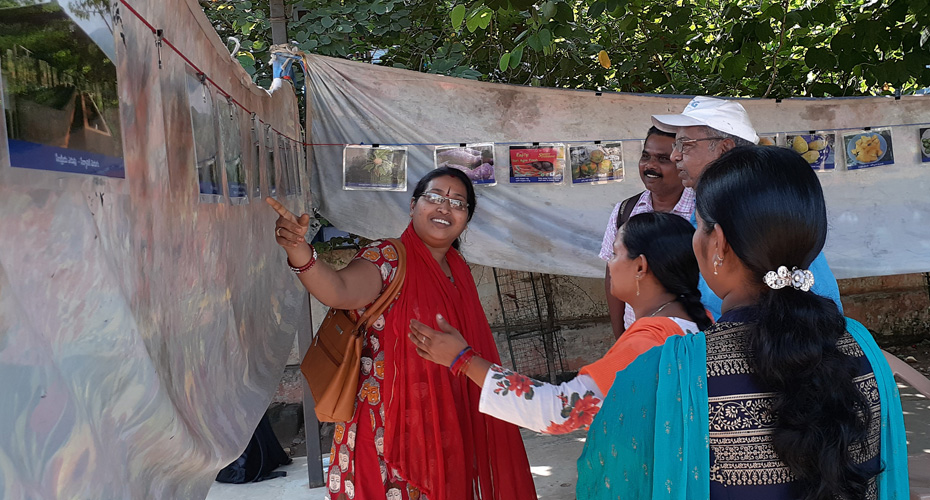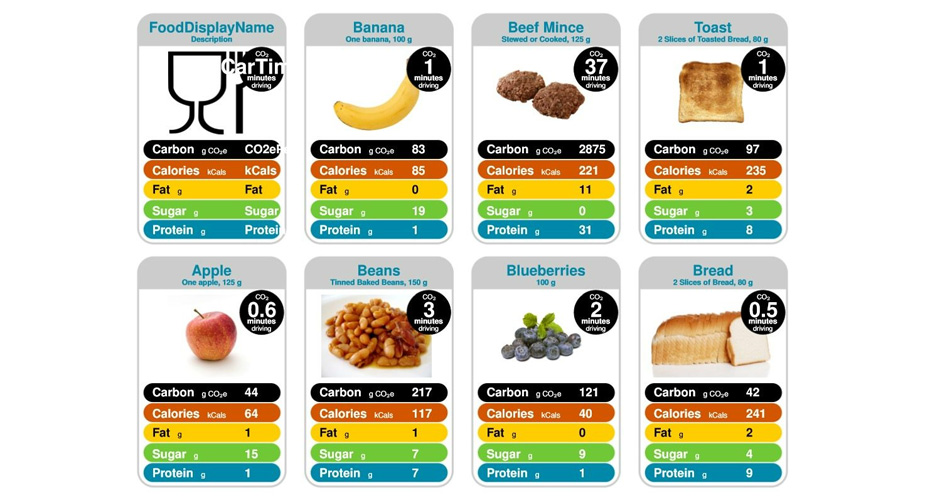Healthier, fairer, and more environmentally sustainable diets
Led by Dr Kerry Ann Brown, this theme brings together interdisciplinary projects that look at how we can improve food systems to make them healthier, fairer, and more environmentally sustainable. In particular, they recognise the role of the environment in promoting health for future generations, and the risks of health inequalities related to diet and food security.

Currently food systems (how we grow, sell, and consume our food) are neither good for planetary nor public health, as they contribute to an over-exploitation of global natural resources and we have increasingly high levels of dietary-related diseases.
These projects look to explore, investigate, and evaluate the impact of changes to our food systems, such as the implementation of a food policy or rising global temperatures, and consider any risks, trade-offs, and unintended positive/negative consequences.
Working with communities
Our projects often use innovative ways to engage communities in research and co-create research with communities, e.g. through the use of video and photography.
If you or your community wish to be involved in research related to food and public or planetary health, please contact either the NIHR School for Public Health Environments Research at Exeter (SPHERE) or the NIHR Applied Research Collaboration South West Peninsula (Pen-ARC) ‘how to get involved’ teams and mark your message FAO Dr Kerry Ann Brown.

Current projects
Calorie labelling

Does mandatory calorie labelling impact people's food choices?
The impact of mandatory energy (kcal) labelling policy in out-of-home food environments.
An unhealthy diet is a key determinant of obesity, and food environments play a role in determining whether we have healthy diets. Food and drinks prepared away from the home are widely available in England where there is a high density of (fast-food) restaurants, and online food delivery services are developing rapidly. This increases people’s access to foods high in energy, fat, salt, and sugar.
In April 2022, the government introduced an energy (kcal) labelling policy in England, which requires large businesses selling food and drinks (e.g. restaurants, cafes, fast food chains) to show energy information (in kcal) on the menus. The aim of this policy is to help people make healthier decisions when buying food prepared outside the home and to encourage businesses to provide healthier and lower-calorie options.
This 24-month project evaluates the impact of the calorie labelling policy on diets and health in England. The project is a collaboration with London School of Hygiene and Tropical Medicine (LSHTM) and the University of Sheffield, and includes four work packages (WP):
- WP1 measures changes in food and drink purchases before and after the labelling policy came into effect. We do this using a large database, collected by an international market research company, of people’s expenditures on foods consumed outside homes.
- WP2 models how changes in purchases due to labelling policy affect health outcomes and healthcare costs. We will use the School for Public Health Research Diabetes Prevention Microsimulation Model to do this.
- WP3 looks at changes in the availability and prices of foods within restaurants that provide takeaway food delivery via online delivery platforms. This is done using data collected from websites of two large online food delivery platforms before and after the labelling policy was introduced.
- WP4 captures the views of young people (11-19 years) on the calorie labelling policy and priorities for change within their local food environments. This is done in two case study sites (inner city London and coastal Devon) using photography and video to help create discussions.
All analyses will consider socio-economic status and area deprivation throughout, to understand the impact of the policy on health inequalities.
Public involvement:
We have consulted with two panels of young people in London and Devon to inform the framing of the project and the design of the work package about young people’s views (WP4). These panels will be public patient involvement & engagement (PPIE) partners throughout the project, supporting the development of WP4 as well as providing an early review of project findings, including how each work package speaks to the others. They will also work with us on how to present the findings to various audiences.
Findings:
Findings from the project will be communicated in different ways, including:
- an exhibition for young people
- a research summary report
- presentations for policymakers or at scientific conferences
- and publications in academic journals.
Collaborators:
- Dr Laura Cornelsen
- Dr Dalya Marks
- Camilla Forbes
- NIHR School for Public Health Environments Research at Exeter (SPHERE)
- Relational Health Research Group
Funding:
Funded by the NIHR School of Public Health Research.
Sustainability

How is sustainability integrated into dietary guidelines around the world?
A series of qualitative interviews and workshops with experts around the world to share best practice and identify the challenges of integrating environmental sustainability into dietary guidelines.
Collaborators:
Nutrition labels
The impact of front-of-pack food labelling across the food system: a scoping review
UK and EU governments are considering how to implement the most effective front-of-pack nutrition labelling scheme. Nutrition labels on food products are considered public health tools: designed to communicate nutritional information and inform healthy dietary choices. However, their impact throughout the food system, other than on food choice, is less clear.
A scoping review will identify studies exploring the impact of three front-of-pack food labelling schemes:
- multiple traffic light label,
- Nutri-Score label,
- and warning labels
on outcomes across the food system (other than food choice). This project is in collaboration with London School of Hygiene and Tropical Medicine (LSHTM) and the University of Reading.
Findings
Findings will be reported in line with PRISMA Scoping Review guidelines.
Collaborators
Funding
LSHTM seed grant
SHEFS

(Sustainable & Healthy Food Systems)
SHEFS is a global research programme funded by the Wellcome Trust (running from 2017 to 2023). The project aims to provide new, interdisciplinary research that policymakers can use to shape food systems that will deliver healthy, accessible, affordable, and sustainable food for future populations.
SHEFS has three country case study sites: the United Kingdom, South Africa and India. It is a multi-partner research consortium led by the London School of Hygiene and Tropical Medicine (LSHTM) in partnership with:
- the University of KwaZulu Natal;
- University College London;
- the University of Sheffield;
- the Centre for Food Policy at City, University of London;
- the Food Foundation;
- the University of Aberdeen;
- the Royal Veterinary College;
- and the Centre for Chronic Disease Control in India.
Collaborators:
Funding:
Funded by the Wellcome Trust Our Planet Our Health programme.
Related publications:
Read project publications on the SHEFS Publications page.
Camels and zoonotic disease
Knowledge exchange through a Bedouin lens: Camel owner perceptions of zoonotic disease risk
Efforts to mitigate the risk of zoonotic disease in Jordanian Bedouin populations are focused on hygiene interventions and vaccine development. Understanding context-specific social, cultural or practical barriers to implementing these interventions is crucial to their success. This One Health project brings together experts in public health nutrition and veterinary health from the Royal Veterinary College, UK and Yarmouk University, JO, to understand these barriers and develop dialogue with the Bedouin community.
A particular challenge in this context is the relationship between people and camels, which are the reservoir for human Middle East respiratory syndrome coronavirus (MERS-CoV). Camels occupy a unique status in Bedouin Arab culture. Historically they have played a vital role in human survival in the desert. They are identified in the Qur’an as an example of God’s great power and wisdom, with Hadiths describing healing effects of drinking camels’ milk and urine. Camels are therefore viewed as uniquely ‘clean’ animals, incapable of transmitting infections to people, so close contact with camels or consumption of camel products is not perceived as a public health concern.
This project uses participatory photography (photovoice) to explore Jordanian Bedouin camel owners’ perspectives and practices relevant to zoonotic disease control and to initiate new dialogue between community members and researchers. Findings will contribute to developing culturally-appropriate messages and interventions.
Collaborators:
Funding:
External engagement and outreach
- Dr Brown was an invited speaker and co-author on how to integrate sustainability into the 2022 Nordic Nutrition recommendations. The full recommendations will be released in 2023.
- Dr Brown took part in the Sustainability on Screen series at the Exeter Phoenix Theatre in 2023.



